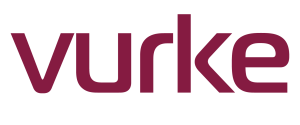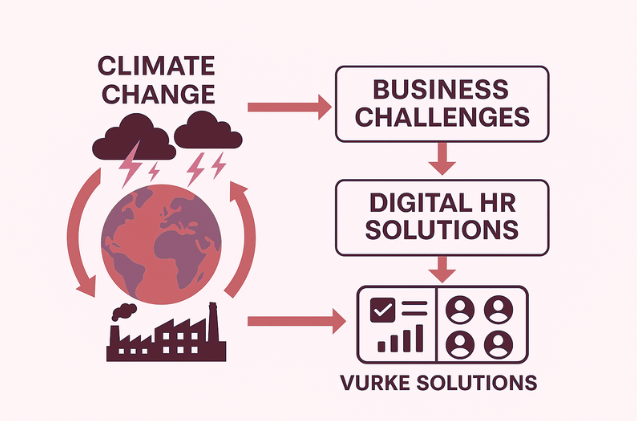table of contents
- Impact on Businesses and Workforce
- Where Vurke Fits In
- Digital Transformation for Sustainability
- Practical Steps for Companies
- Conclusion
- FAQs
- How does climate change affect businesses today?
- What are the biggest challenges companies face due to climate change?
- How can digital transformation help businesses adapt to climate change?
- Why is workforce resilience important in climate change?
- How can HR solutions support sustainable business practices?
- What is the role of technology in building business sustainability?
- How can small and medium businesses adapt to climate change?
- How can small and medium businesses adapt to climate change?
- How prepared is your business to handle the disruptions caused by climate change?
- Could extreme weather events be silently draining your company’s productivity?
- Is your workforce resilient enough to thrive in an era of unpredictable climate shifts?
- What if digital transformation was the key to protecting your business from climate risks?
- Are rising costs from climate disruptions threatening your company’s long-term growth?
- Can HR and workforce solutions really help build business sustainability?
- How would your business respond if a sudden flood, storm, or heatwave shut down operations tomorrow?
- Is your company missing out on the competitive advantage of climate resilience?
- Can cloud-based HR tools reduce your carbon footprint while improving efficiency?
- Are you ready to future-proof your business with smart workforce solutions like Vurke?
Why Businesses Can’t Ignore Climate & Weather Changes
In recent years, climate change has shifted from being a distant concern to an urgent reality. Record-breaking heatwaves, unpredictable monsoons, and extreme flooding events are no longer rare—they are reshaping how societies and businesses operate.
For companies, these climate and weather changes are not just environmental issues; they directly impact the workforce, supply chains, and long-term growth.
Forward-thinking organizations understand that resilience is no longer optional—it’s a competitive advantage. This is where digital transformation and workforce solutions, such as those offered by Vurke
, become essential in helping businesses adapt to uncertainty while staying sustainable.
The Rising Challenge of Climate & Weather Changes
The world is experiencing unprecedented environmental shifts:
- Heatwaves & droughts disrupt agriculture and water supply.
- Floods & storms damage infrastructure and increase insurance risks.
- Shifting seasons affect productivity cycles and demand forecasting.
According to the IPCC (Intergovernmental Panel on Climate Change), global temperatures have already risen by 1.1°C since pre-industrial times, creating ripple effects across ecosystems and economies. The World Bank warns that climate-related disruptions could push millions into poverty by 2030 if businesses and governments fail to adapt.
Impact on Businesses and Workforce
1. Supply Chain Disruptions
Floods, storms, and shifting trade routes can delay shipments and increase operational costs.
2. Employee Wellbeing
Heat stress, natural disasters, and air quality issues affect employee health, productivity, and absenteeism.
3. Remote Work Challenges
Power outages and poor infrastructure during climate events make remote collaboration difficult.
4. Rising Costs
From insurance premiums to compliance with environmental regulations, climate adaptation adds financial pressure.
Companies that fail to anticipate these disruptions risk losing both talent and market competitiveness.
Where Vurke Fits In
Amid these uncertainties, organizations need technology that not only manages people but also builds resilience. This is where Vurke’s solutions step in:
-
Workforce Management → Flexible scheduling and attendance systems help businesses adapt during climate disruptions.
-
Payroll & Compliance → Automated payroll ensures employees are supported even when traditional operations are disrupted.
-
Global HR Solutions → Businesses operating across multiple regions can stay compliant with changing environmental and labor regulations.
By combining efficiency with adaptability, Vurke empowers companies to keep their workforce safe, motivated, and productive—even in challenging times.
Digital Transformation for Sustainability
Digital transformation is no longer just about efficiency; it’s about sustainability. With the right tools, organizations can lower their environmental footprint while maintaining productivity.
Here’s how Vurke contributes to this shift:
-
Cloud-Based HR Systems reduce paper use and minimize office energy consumption.
-
Remote Collaboration Tools support hybrid work, cutting down on commuting-related emissions.
-
Data-Driven Decisions help forecast workforce needs in relation to climate risks.
-
Green Compliance ensures adherence to environmental standards and reporting requirements.
Practical Steps for Companies
Every business, regardless of size, can take proactive measures to adapt to climate and weather changes.
Actionable strategies include:
Vurke’s HR, payroll, and workforce tools enable these strategies, ensuring companies can implement them effectively.
Conclusion
Climate change is not just an environmental issue—it is a business reality that demands immediate attention. From disrupted supply chains to employee wellbeing, organizations must prepare for the unpredictable.
By embracing digital transformation, companies can build both resilience and sustainability. With Vurke’s workforce and HR solutions, businesses can stay agile, compliant, and future-ready in the face of climate challenges.
Discover how Vurke helps organizations build resilience in a changing climate.
👉 Explore Vurke’s solutions
FAQs
How does climate change affect businesses today?
Climate change affects businesses through supply chain disruptions, rising costs, and workforce productivity loss.
What are the biggest challenges companies face due to climate change?
Companies face challenges like extreme weather risks, regulatory compliance, and higher operational costs.
How can digital transformation help businesses adapt to climate change?
Digital transformation helps businesses adapt by enabling remote work, automation, and climate resilience.
Why is workforce resilience important in climate change?
Workforce resilience ensures employees remain safe, productive, and engaged during climate disruptions.
How can HR solutions support sustainable business practices?
HR solutions support sustainability by reducing paper, automating compliance, and enabling hybrid work.
What is the role of technology in building business sustainability?
Technology reduces emissions, streamlines operations, and ensures compliance with environmental standards.
How can small and medium businesses adapt to climate change?
SMBs can start by embracing cloud-based HR and payroll solutions, adopting hybrid work models, and focusing on employee wellbeing. Vurke’s solutions are scalable, making them ideal for small businesses looking to build resilience.
How can small and medium businesses adapt to climate change?
SMBs can start by embracing cloud-based HR and payroll solutions, adopting hybrid work models, and focusing on employee wellbeing. Vurke’s solutions are scalable, making them ideal for small businesses looking to build resilience.
How prepared is your business to handle the disruptions caused by climate change?
Most businesses are unprepared, but Vurke’s digital solutions ensure continuity and resilience.
Could extreme weather events be silently draining your company’s productivity?
Yes, climate disruptions lower productivity, but digital HR tools help maintain efficiency.
Is your workforce resilient enough to thrive in an era of unpredictable climate shifts?
A resilient workforce requires flexible work models, wellness support, and digital readiness.
What if digital transformation was the key to protecting your business from climate risks?
Digital transformation enables agility, automation, and continuity during climate challenges.
Are rising costs from climate disruptions threatening your company’s long-term growth?
Yes, but smart workforce management reduces inefficiencies and controls rising expenses
Can HR and workforce solutions really help build business sustainability?
Yes, workforce solutions cut carbon footprints while improving compliance and efficiency.
How would your business respond if a sudden flood, storm, or heatwave shut down operations tomorrow?
Prepared businesses use flexible scheduling, payroll automation, and remote tools to adapt.
Is your company missing out on the competitive advantage of climate resilience?
Yes, climate-resilient businesses attract talent, save costs, and build customer trust.
Can cloud-based HR tools reduce your carbon footprint while improving efficiency?
Yes, cloud HR systems eliminate paper use, lower emissions, and streamline processes.
Are you ready to future-proof your business with smart workforce solutions like Vurke?
Future-proofing starts with Vurke’s digital tools that ensure agility and sustainability.



